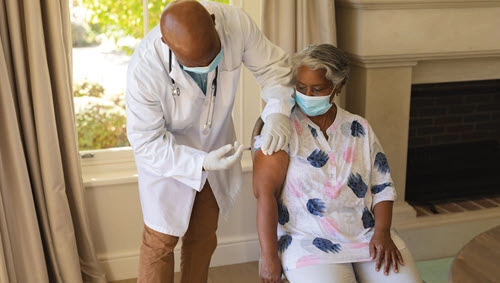Know Your Obligations Around Now-Mandatory COVID-19 Vaccinations
In protecting seniors, CMS risks further exacerbating the chronic staffing issues in long-term care. The Food and Drug Administration has approved the Pfizer-BioNTech COVID-19 vaccine, which will now be called Comirnaty. The official full approval comes days after the Centers for Medicare & Medicaid Services (CMS) announced a vaccination mandate for nursing home workers. “While millions of people have already safely received COVID-19 vaccines, we recognize that for some, the FDA approval of a vaccine may now instill additional confidence to get vaccinated. Today’s milestone puts us one step closer to altering the course of this pandemic in the U.S.,” says Janet Woodcock, MD, acting commissioner of the FDA. With the delta variant causing another surge in the pandemic, individual facilities, towns, states, and entire countries are grappling with rampant misinformation and distrust among the public surrounding COVID-19 and the vaccine that helps prevent or lessen the severity of infection. Industry stakeholders worry that uneven mandates within healthcare may cause even more staff turnover. CMS is Focusing on Nursing Homes Specifically The initial waves of the pandemic hit elderly people and nursing homes hard, and data suggests that COVID-19 was largely introduced to facilities via staff members. “Keeping nursing home residents and staff safe is our priority. The data are clear that higher levels of staff vaccination are linked to fewer outbreaks among residents, many of whom are at an increased risk of infection, hospitalization, or death,” said Chiquita Brooks-LaSure, CMS administrator. “We will continue to work closely with our partners at the [Centers for Disease Control and Prevention] CDC, long-term care associations, unions, and other stakeholders to advance policies that keep residents and staff safe. As we advance these new requirements, we’ll work with nursing homes to address staff and resident concerns with compassion and by following the science,” she said. Leaders in the long-term care industry worry that the edict may do more harm than good, because the mandate affects nursing homes across the country, while leaving other parts of the healthcare sector, like hospitals, to make decisions on an individual organizational basis. “We appreciate the Administration’s efforts to increase COVID-19 vaccinations in long term care. Unfortunately, this action does not go far enough,” says Mark Parkinson, president and CEO of the American Health Care Association and National Center for Assisted Living (AHCA/NCAL). “The government should not single out one provider group for mandatory vaccinations. Vaccination mandates for health care personnel should be applied to all health care settings. Without this, nursing homes face a disastrous workforce challenge.” With the FDA’s full approval, vaccine mandates for all healthcare institutions may be announced and enforced, but until then, the specter of nursing home staff fleeing to other roles and other places looms. “Focusing only on nursing homes will cause vaccine hesitant workers to flee to other health care providers and leave many centers without adequate staff to care for residents,” Parkinson says. “It will make an already difficult workforce shortage even worse. The net effect of this action will be the opposite of its intent and will affect the ability to provide quality care to our residents. We look forward to working with the Administration in the coming days to develop solutions to overcome this challenge.” Prioritize One-On-One Conversations Vaccine hesitancy is not a new phenomenon, though the hysteria surrounding it has reached new heights. Experts agree that talking one-on-one—and mostly listening — to those who are hesitant can help provide the reassurance and confidence a person may need to pursue vaccination. If you have staff who aren’t vaccinated, take the time now to reach out, before the mandate goes into effect (which CMS expects to be in September). CMS has already put pressure on facilities to do what they can to educate and support employees to get vaccinated; the agency still expects facilities to do what they can to get employees vaccinated. “CMS also expects nursing home operators to use all available resources to support employees in getting vaccinated, including employee education and vaccination clinics, as they work to meet this staff vaccination requirement,” says Catherine Howden, director of CMS’ news and media group. “Keeping nursing home residents and staff safe is our priority. The data are clear that higher levels of staff vaccination are linked to fewer outbreaks among residents, many of whom are at an increased risk of infection, hospitalization, or death,” Brooks-LaSure said.


